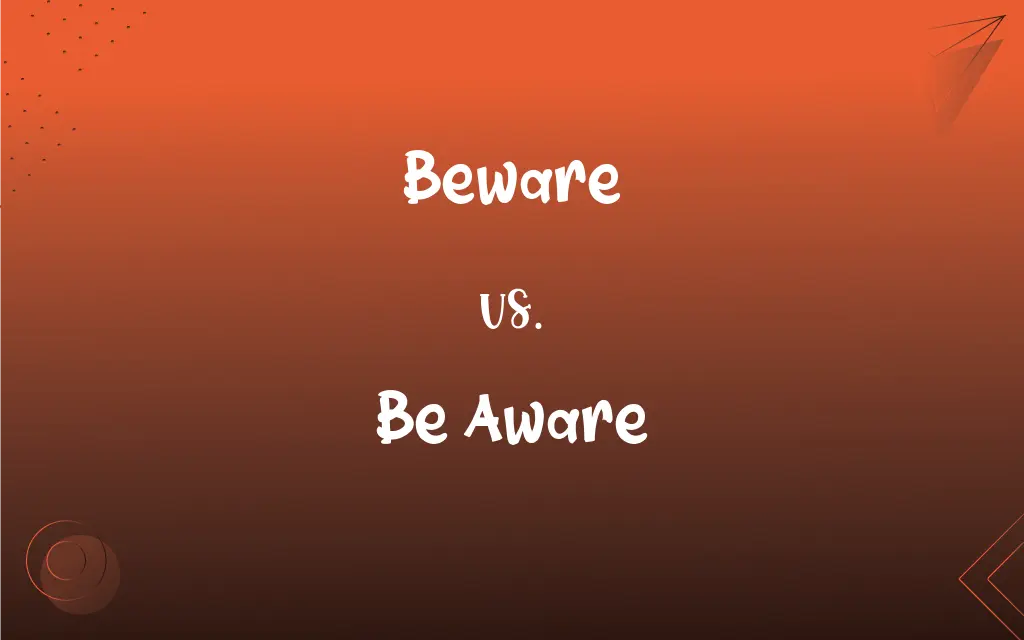Beware vs. Be Aware: What's the Difference?
Edited by Aimie Carlson || By Harlon Moss || Updated on October 19, 2023
"Beware" is a warning to avoid danger or trouble, while "be aware" means to have knowledge or consciousness of something.

Key Differences
"Beware" is an imperative verb that advises someone to be on guard against a threat or danger. In contrast, "be aware" is a phrase urging someone to have knowledge or perception about a particular thing or situation.
When someone says "beware," they are cautioning against potential harm or advising to avoid a particular situation. On the other hand, "be aware" simply means to recognize, understand, or be informed about something without necessarily implying danger.
For example, a sign might read "beware of the dog," indicating a potential threat from the animal. In comparison, a sign that says "be aware of the wet floor" is informing individuals about a condition they should know about.
Usage context differentiates "beware" and "be aware." "Beware" is often used in contexts where there's a need to alert someone about potential danger. In contrast, "be aware" is used more broadly to suggest that someone should be informed or conscious of something.
The primary distinction between these two phrases hinges on the implication of danger. "Beware" is inherently cautionary, suggesting an impending threat. "Be aware," however, revolves around the concept of consciousness or being informed without the inherent threat.
ADVERTISEMENT
Comparison Chart
Meaning
Warning against danger or threat.
Having knowledge or consciousness of something.
Usage
Imperative verb.
Phrase.
Context
Typically used in cautionary scenarios.
Used to inform or make someone conscious.
Implication
Suggests potential harm.
Does not inherently suggest danger.
Example
"Beware of the dog."
"Be aware of the rules."
ADVERTISEMENT
Beware and Be Aware Definitions
Beware
A warning to guard oneself from a specific danger.
Beware of deals that seem too good to be true.
Be Aware
To have consciousness or knowledge of something.
Be aware of your surroundings when hiking.
Beware
An admonition to avoid something threatening.
Beware of false information online.
Be Aware
To be informed about a particular matter.
It's important to be aware of the latest news developments.
Beware
To be cautious and alert to potential dangers.
Beware of slippery surfaces when it rains.
Be Aware
To recognize or understand a specific fact or situation.
I want you to be aware of the consequences of your actions.
Beware
A directive to be on one's guard.
You should beware when walking alone at night.
Be Aware
To be alert or attentive to a specific detail or fact.
Be aware of the expiration dates on your medications.
Beware
To watch out for potential harm.
Travelers should beware of pickpockets in crowded areas.
Be Aware
To be cognizant or mindful of something.
You should be aware of the cultural customs when traveling.
Beware
To be on guard against; be cautious of
"Beware the ides of March" (Shakespeare).
FAQs
What is the primary purpose of using "beware"?
"Beware" is used to warn or caution against potential dangers or threats.
Which phrase might be used in a cautionary road sign about wildlife?
"Beware of crossing deer."
Is "beware" more proactive or reactive?
"Beware" is proactive, advising caution in advance.
In which context might "be aware" be used regarding education?
"Be aware of the upcoming exam dates."
How would you tell someone to be conscious of time?
"Be aware of the time."
Can "be aware" be used in the context of self-awareness?
Yes, as in "be aware of your emotions and reactions."
Can "be aware" be used to imply caution without direct danger?
Yes, like "be aware of the wet floor," which advises caution without direct harm.
Does "beware" suggest an immediate threat?
It suggests a potential threat but not necessarily an immediate one.
If you wanted someone to know about a meeting, which phrase would you use?
"Be aware that there's a meeting at 3 PM."
How would you advise someone of a change in weather?
"Be aware that it's expected to rain later."
Can "beware" and "be aware" be used interchangeably?
No, they serve different purposes; "beware" warns, while "be aware" informs.
How would you advise someone about a change in policy?
"Be aware that the policy has changed."
Which phrase would be more suitable for a mindfulness exercise?
"Be aware of your breathing."
Which phrase might be used to alert someone of a potential scam?
"Beware of fraudulent emails."
Is "beware" an imperative command?
Yes, "beware" is an imperative verb instructing caution.
Can "beware" be used in a friendly context?
Typically, no, as "beware" usually indicates a cautionary tone.
Does "be aware" always indicate a threat?
No, "be aware" simply means to have knowledge or consciousness and does not inherently imply danger.
How is the sense of danger conveyed differently between the two?
"Beware" directly warns of danger, while "be aware" informs without an inherent threat.
How might "beware" be used regarding online security?
"Beware of phishing websites."
If you want someone to be cautious around a protective mother cat, which phrase is apt?
"Beware of the mother cat when approaching her kittens."
About Author
Written by
Harlon MossHarlon is a seasoned quality moderator and accomplished content writer for Difference Wiki. An alumnus of the prestigious University of California, he earned his degree in Computer Science. Leveraging his academic background, Harlon brings a meticulous and informed perspective to his work, ensuring content accuracy and excellence.
Edited by
Aimie CarlsonAimie Carlson, holding a master's degree in English literature, is a fervent English language enthusiast. She lends her writing talents to Difference Wiki, a prominent website that specializes in comparisons, offering readers insightful analyses that both captivate and inform.































































